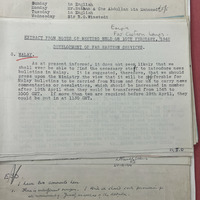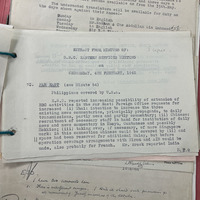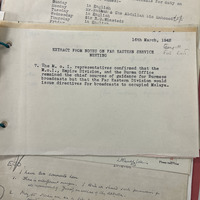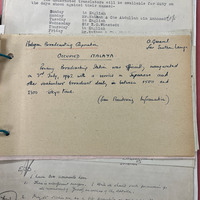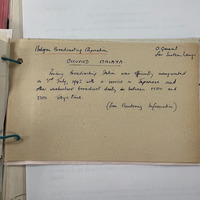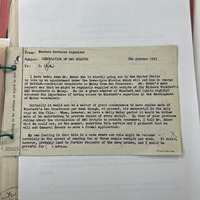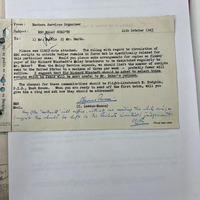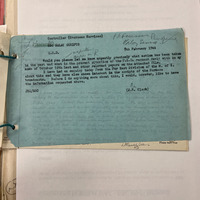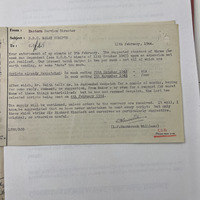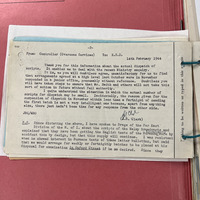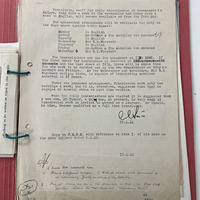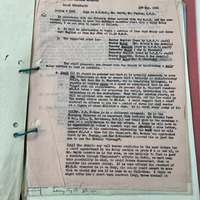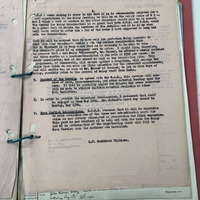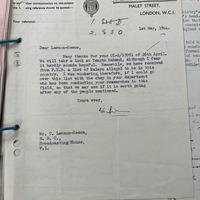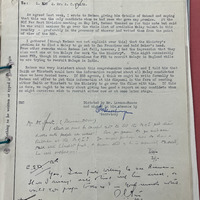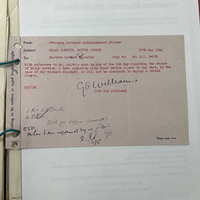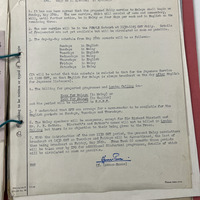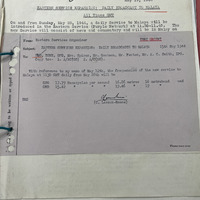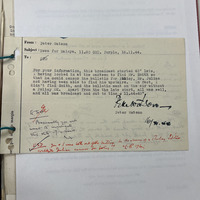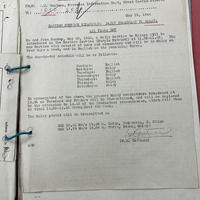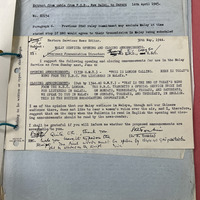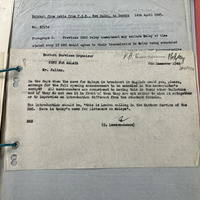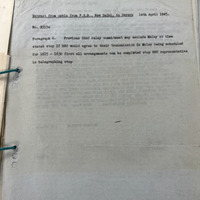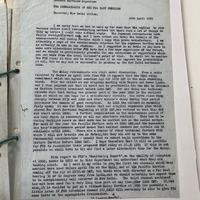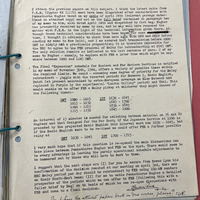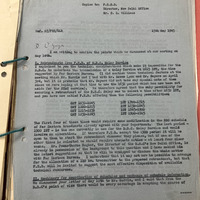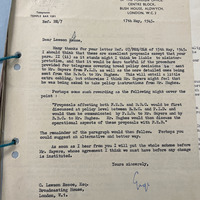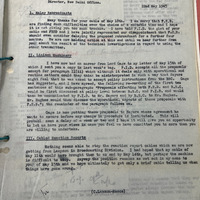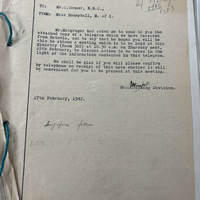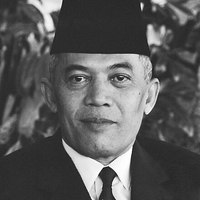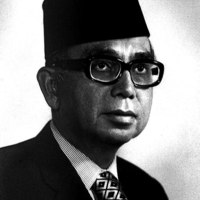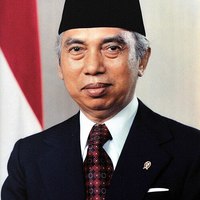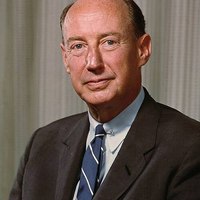Search
838 items
-
It was discussed that they do not have adequate number of staff to introduce news bulletins to the Malaya, and it was suggested that they carry new commentaries of newsletters instead. More »Article
-
It was suggested they increase activity in Far East, including increasing staff and extending coverage. More »Article
-
It was discussed that the M.O.I. representatives confirmed chief guiding offices for Burmese and Malaya broadcasts. More »Article
-
States that the Penang Broadcasting Station has been inaugurated on July 3, 1942. More »Article
-
The list of schedule for the day-by-day transmisson in the daily service in Indonesia. More »Article
-
It states that a Mr. Baker was requesting the broadcasting script of Mr.Winsteadt as he is an admirer of his work. The sender then asks if relaxing the rule of circulating manuscripts to private consumers might lead to more requests of the same nature. More »Message
-
C. Lawson-Reece confirms that prior ruling on the circulation of scrips have been relaxed for Mr. Bakers request. He suggested that Mr. Winsteadt choose which scipts to give, and to limit them to three per week. More »Message
-
J.B Clark inquires regarding the situation on P.I.D. request. He also states that the Far East Division has also shown interest in the Burmese scripts. More »Message
-
L.F. Williams stated that they have sent two scripts per week since the approval that Mr. Baker can have a copy of them, but they have since suspended the dispatch of the scripts due to the lack of response from Mr. Bakers group. More »Message
-
J.B.Clark informs L.F. Rushbook that the suspension of the dispatch of scripts were not intelligent as Mr. Bakers group just had not had to respond. He also hopes that the supply will resume. More »Message
-
L.F. Rushbook Williams apologizes for suspending the dispatch of transcripts to Mr. Baker and says that decisions of that nature will not be made without consultation in the future. More »Audio
-
The memo states the schedule for the translation staff who are to work two mornings a week, and will be put on special rates as they will be considered as part time employees. More »Article
-
The letter discusses the schedule for service, staff content, and news implications. More »Message
-
The letter discusses the schedule for service, staff content, and news implications. More »Message
-
Sender states that they have recieved a list of Malays alleged to be in the country, and suggests to go over the list with someone within the department. More »Message
-
The letter stated that the Ministry is looking for one or two Malay staff to work in England. Redman also suggested a comprehensive vetting process in finding a candidate. More »Message
-
Sir Guy William states that with reference to Mr. A.C. Smiths note on censor of Malay Service, he has authority to suggest that it is unnecessary to emplou a Switch Censor. More »Message
-
The letter lists down the new daily schedule of for the Malayan Broadcasts, dividing the week between English and Malay broadcasts. They are also to add an 11:30 GMT broadcast period. More »Article
-
The telegram lists down the new frequencies addes, referencing the Memo from May 12, 1944 regarding the expansion of the breadcast hours More »Message
-
The telegram states that the broadcast 1130 GMT slot started 45" late, and that Mr. Smith could not be found, resulting in the broadcasting of the entire bulleting out of time and without policy approval. More »Message
-
Schedule for the added daily broadcast called the Purple Network, going from 1130 to 1145 GMT More »Article
-
G.H Tonkin suggested the opening and closing script and stated that he is of the opinion that the Malay audience do not like hearing a womans voice, and that the script should be read by the news-reader. More »Message
-
C. Lawson-Reece suggested that the opening announcement be embodied in the news readers script for convenience. More »Message
-
The letter discusses the rebroadcasts from the Malaya services,machinery for the coordination of schedules and exchange of information, and the monitoring of reports from the Far East Broadcasts. More »Message
-
Sir Guy Williams suggests to reword the paragraph two in the letter to cover the point. More »Message
-
The Letter discusses the transmission of Malayan language in Malay, and the change of scheduling for the broadcasts. More »Message
-
Lawson-Reece responds to the rewording of paragraph ii, agreeing to rephrasing. The rescheduling of the BBC Malaya rebroadcasts are also discussed. More »Message
-
Memo on the Malay rebroadcasts, Liasion Machinery, and Cable Reaction Reports More »Article
-
Sender hopes that receiver will attend the meeting to be held in the Ministry of Information in Singapore on the 19th of February to discuss information contained in the telegram they have received from Batavaia. More »Message
-
Abdul Haris Nasution (Old Spelling: Abdoel Haris Nasution; 3 December 1918 – 6 September 2000) was a high-ranking Indonesian general and politician. He served in the military during the Indonesian National Revolution and he remained in the military during the subsequent turmoil of the Parliamentary democracy and Guided Democracy. Following the fall of President Sukarno from power, he became the Speaker of the People's Consultative Assembly under President Suharto. Born into a Batak Muslim family, in the village of Hutapungkut, Dutch East Indies, he studied teaching and enrolled at a military academy in Bandung. He became a member of the Royal Netherlands East Indies Army, but following the Japanese invasion, he joined the Defenders of the Homeland. Following the proclamation of independence, he enlisted in the fledgling Indonesian armed forces and fought during the Indonesian National Revolution. In 1946, he was appointed commander of the Siliwangi Division, the guerrilla unit operating in West Java. After the end of the national revolution, he was appointed Chief of Staff of the army, until he was suspended for his involvement in the 17 October affair. He was reappointed to the position in 1955. In 1965, an attempted coup occurred, later officially blamed on the Communist Party of Indonesia. Nasution's house was attacked, and his daughter was killed, but he managed to escape by scaling a wall and hiding in the Iraqi ambassador's residence. In the following political turmoil, he assisted in the rise of President Suharto and was appointed Speaker of the People's Consultative Assembly. He had a falling out with Suharto, who saw him as a rival, and he was pushed out of power in 1971. Once he was removed from positions of power, Nasution developed into a political opponent of Suharto's New Order Regime, though he and Suharto began to reconcile in the 1990s. He died on 6 September 2000 in Jakarta, after suffering a stroke and going into a coma. His body was interred at Kalibata Heroes Cemetery. (Wikipedia) More »Person
-
Tun Haji Abdul Razak bin Dato' Hussein (Jawi: عبد الرزاق بن حسين; 11 March 1922 – 14 January 1976) was a Malaysian lawyer and politician who served as the second prime minister of Malaysia from 1970 until his death in 1976. He also served as the first deputy prime minister of Malaysia from 1957 to 1970. He is referred to as the Father of Development (Bapa Pembangunan). Abdul Razak was the figure responsible for setting up Barisan Nasional (BN), which is the ruling coalition of political parties that held power in Malaysia. Abdul Razak is also renowned for launching the Malaysian New Economic Policy (MNEP). His eldest son, Najib Razak, became the sixth prime minister in 2009; Najib is the first prime minister of Malaysia to be a descendant of a former prime minister. (Wikipedia) More »Person
-
Adam Malik Batubara (22 July 1917 – 5 September 1984) was an Indonesian politician, diplomat, and journalist, who served as the third vice president of Indonesia from 1978 until 1983, under President Suharto. Previously, he served in a number of diplomatic and governmental positions, including Speaker of the People's Consultative Assembly from 1977 to 1978, Speaker of the People's Representative Council from 1977 to 1978, Foreign Minister of Indonesia from 1966 until 1977, and president of the United Nations General Assembly from 1971 until 1972. Born in Pematangsiantar, North Sumatra, on 22 July 1917. He grew up relatively comfortably, and was educated at the Hollandsch-Inlandsche School (HIS). He pioneered the establishment of the Antara news agency in 1937, and was an active supporter of Indonesian independence, being put in prison for disobeying the Colonial Government's ban on political assemblies. Towards independence on 17 August 1945, he was involved in the Rengasdengklok incident and the Proclamation of Independence. Following independence, he served in a number of government positions, including as a member of the People's Representative Council (DPR) and as the Minister for Trade. He continued to serve in government, following the fall of Sukarno. Being appointed Foreign Minister in 1966. In 1977, he was elected as Speaker of both the People's Representative Council (DPR) People's Consultative Assembly (MPR). In 1978, he was elected as the 3rd Vice President of the Republic of Indonesia replacing Sri Sultan Hamengkubuwono IX who unexpectedly stated that he was not willing to be nominated again. As vice president, he criticized the government for its increasing feudalism-like structure and rampant corruption, referring it as an "epidemic." In 1983, Malik's term as Vice-President came to an end and he was replaced by Umar Wirahadikusumah. Adam Malik died on 5 September 1984, in Bandung, due to liver cancer. His body was interred in the Kalibata Heroes Cemetery. Later, his wife and children established the Adam Malik Museum. He was designated as a National Hero on 6 November 1998 based on Presidential Decree No. 107/TK/1998. (Wikipedia) More »Person
-
Adlai Ewing Stevenson II (; February 5, 1900 – July 14, 1965) was an American politician and diplomat who was the United States Ambassador to the United Nations from 1961 until his death in 1965. He previously served as the 31st governor of Illinois from 1949 to 1953 and was the Democratic nominee for president of the United States in 1952 and 1956, losing both elections to Dwight D. Eisenhower in a landslide. Stevenson was the grandson of Adlai Stevenson I, the 23rd vice president of the United States. Raised in Bloomington, Illinois, Stevenson was a member of the Democratic Party. He served in many positions in the federal government during the 1930s and 1940s, including the Agricultural Adjustment Administration, Federal Alcohol Administration, Department of the Navy, and the State Department. In 1945, he served on the committee that created the United Nations, and was a member of the initial U.S. delegations to the UN. In 1948, he was elected governor of Illinois, defeating incumbent governor Dwight H. Green in an upset. As governor, Stevenson reformed the state police, cracked down on illegal gambling, improved the state highways, and attempted to cleanse the state government of corruption. Stevenson also sought, with mixed success, to reform the Illinois state constitution and introduced several crime bills in the state legislature. In the 1952 and 1956 presidential elections, he was chosen as the Democratic nominee for president, but was defeated in a landslide by Republican Dwight D. Eisenhower both times. In 1960, he unsuccessfully sought the Democratic presidential nomination for a third time at the Democratic National Convention. After President John F. Kennedy was elected, he appointed Stevenson as the United States Ambassador to the United Nations. Two major events Stevenson dealt with during his time as UN ambassador were the Bay of Pigs Invasion of Cuba in April 1961 and the Cuban Missile Crisis in October 1962. He was still serving as UN ambassador when he suffered a heart attack during a visit to London in July 14, 1965, later dying that day at the age of 65. He is buried in Evergreen Cemetery in his hometown of Bloomington, Illinois. (Wikipedia) More »Person


